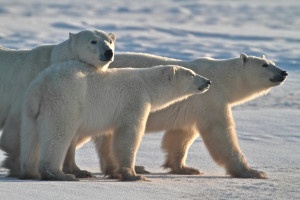We have much more to do and your continued support is needed now more than ever.
Judge Takes Away Critical Polar Bear Habitat

The timing of this announcement could not be worse. The bears saw their Arctic ice habitat melt to a record-shattering low this past summer, a sign that climate change is altering the planet at a much faster pace than previously projected.
To make matters worse for polar bears, in response to a lawsuit by the Alaska Oil and Gas Association and the state of Alaska, a judge overturned a federal rule aimed at protecting critical habitat for polar bears in the U.S. The decision, if not reversed, means that notwithstanding the disturbance to bears from oil and gas drilling and extraction activities, as well as the outright danger of oil spills, oil and gas development will likely accelerate in prime polar bear habitat.
Protect the Home, Protect the Species
After the polar bear was listed as a threatened species under the Endangered Species Act in 2008, the U.S. Fish and Wildlife Service designated more than 187,000 square miles as critical habitat for the struggling Arctic polar bears in 2010. This science-based decision included both Arctic sea ice and terrestrial habitat, including denning areas, for polar bears in Alaska. The designation facilitated greater scrutiny of oil and gas development and stronger safeguards in critical habitat.
Because it helps protect the places where polar bears live, the designation of critical habitat was welcomed as a way to give polar bears a fighting chance against the threats of global warming. The judge’s decision means that polar bears now face the double whammy with their habitat: the sea ice is literally melting away because of global warming and what is left faces increasing disturbance from oil and gas development in the areas they require to hunt, den and rear their young.
Speak Up to Help Polar Bears
Helping polar bears requires protecting them from disturbance, including the threat of oil spills, in their critical habitat. It is imperative that the U.S. Fish and Wildlife Service take action to get the bears’ critical habitat reinstated, by making a few corrections to its original proposal.
![]() Helping polar bears also requires action to reduce the carbon pollution that is accelerating the melting of their Arctic home. You can help polar bears by sending a message to the Environmental Protection Agency in support of limiting carbon pollution from coal-burning power plants.
Helping polar bears also requires action to reduce the carbon pollution that is accelerating the melting of their Arctic home. You can help polar bears by sending a message to the Environmental Protection Agency in support of limiting carbon pollution from coal-burning power plants.





















